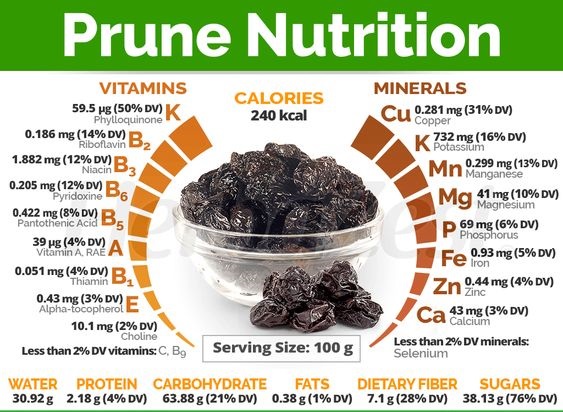Per half-cup serving, prunes contain about 6 grams of dietary fiber—which our bodies rely on for healthy bowel movements. To put that in perspective: The National Academy of Medicine recommends women consume about 25 grams of dietary fiber a day, and men, 38 grams daily.
There are other properties that make prunes exceptional in relieving constipation. Fructose and sorbitol, sugars and sugar alcohols found in the fruit, often produce a laxative-like effect on digestion, making it a bit easier to go.
Because of their sweet flavor and well-known mild laxative effect, prunes are considered to be an epitome of functional foods, but the understanding of their mode of action is still unclear. Dried prunes contain approximately 6.1 g of dietary fiber per 100 g, while prune juice is devoid of fiber due to filtration before bottling. The laxative action of both prune and prune juice could be explained by their high sorbitol content (14.7 and 6.1 g/100 g, respectively). Prunes are good source of energy in the form of simple sugars, but do not mediate a rapid rise in blood sugar concentration, possibly because of high fiber, fructose, and sorbitol content. Prunes contain large amounts of phenolic compounds (184 mg/100 g), mainly as neochlorogenic and chlorogenic acids, which may aid in the laxative action and delay glucose absorption. Phenolic compounds in prunes had been found to inhibit human LDL oxidation in vitro, and thus might serve as preventive agents against chronic diseases, such as heart disease and cancer.
Additionally, high potassium content of prunes (745 mg/100 g) might be beneficial for cardiovascular health. Dried prunes are an important source of boron, which is postulated to play a role in prevention of osteoporosis. A serving of prunes (100 g) fulfills the daily requirement for boron (2 to 3 mg).



No comments:
Post a Comment